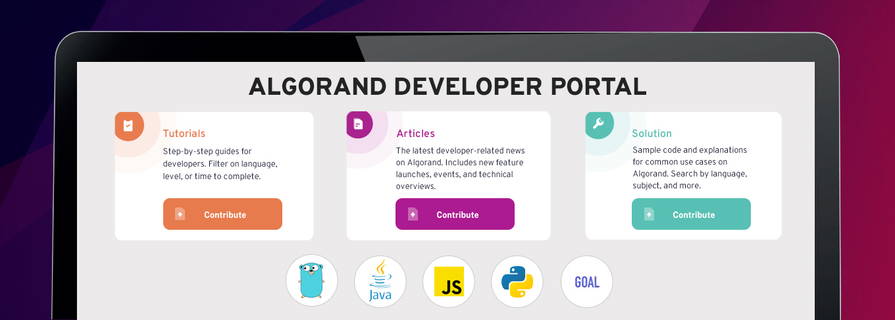documentation
Showing 137 posts related with documentation.
-
 Intermediate · 30 minutes
Intermediate · 30 minutesLimitOrder Contract with Go
A walkthrough example of how to use a limit order contract with Go.
-
 Intermediate · 1 hour
Intermediate · 1 hourAlgorand-Telegram Interactions: Part 1 - The Basics
Create a Telegram Bot which connects your username to your Algorand account, then invoke some transactions.
-
 Intermediate · 1 hour
Intermediate · 1 hourCreating a License Manager Contract utilizing PyTEAL and Inner Transactions
This tutorial will introduce the reader to using Inner Transactions in PyTEAL using an example scenario: A License Manager Contract
-
 Intermediate · 30 minutes
Intermediate · 30 minutesLimitOrder Contract with Python
A walkthrough example of how to use a limit order contract with Python.
-
 Intermediate · 1 hour
Intermediate · 1 hourParticipate in Consensus from Ledger Nano S/X
In this tutorial, we show how to participate in consensus from an account stored in a Ledger Nano S or X. By participating in consensus, you help decentralize the network.
-
 Beginner · 15 minutes or less
Beginner · 15 minutes or lessAccess BetaNet Network using your own node and goal
This tutorial describes how to setup and update a BetaNet network using your own node and goal.
-
 Intermediate · 1 hour
Intermediate · 1 hourIntegrating ALGO and ASA transfers within your application
Learn how to integrate your application with Algo or ASA by walking through code examples.
-

PyTeal — Writing Algorand Smart Contracts in Python
PyTeal is a python language binding for Algorand Smart Contracts (ASC) that abstracts away the complexities in writing smart contracts. PyTeal is provided as an open-source tool for the Algorand community. We invite you to try, use, and contribute to PyTeal if you are interested in developing and deploying ASC’s in Python.
-

Algorand Standard Assets
A conceptual overview of Algorand Standard Assets for developers.
-

Algorand Atomic Transfers
A conceptual overview of Algorand Atomic Transfers for developers.
-

Automating with the Mule Framework
Mule is a generalized automation framework for organizing the execution of defined automation in a declarative yaml format.
-

Welcome to the Algorand Developer Portal
The new Algorand Developer Portal provides resources for developers to turn their ideas into full-scale applications. Browse and search across new content, like Tutorials and Solutions. Access technical documentation. Stay up-to-date on the latest features.
-

Getting Started on Algorand
In this article, we are going to cover some of the basics of where to start, what tutorials are available, options for setting up your development environment, and how you can be rewarded for developing applications on the Algorand blockchain.
-

Updated PyTeal Resources
PyTeal, a language binding for TEAL, is a community project created to make writing Algorand Smart Contracts (ASC) easier. This article summarizes the latest resources available to start building Algorand Smart Contracts in Python.
-

How to Write Smart Contracts
This article summarizes the three primary ways you can build Algorand Smart Contracts.
-

Verify Signatures and Signed Data within Algorand Smart Contracts
This article explains how to use the ed25519verify opcode in conjunction with the tealsign goal command.
-

What's New: Algorand v2.0.7
Algorand v2.0.7 was released to MainNet and TestNet, accompanied by a new set of features in the Algorand APIs. Learn more about what's new in this article.
-

Algorand V2 SDK Asset and Atomic Transfer Examples
New Algorand SDK V2 examples for Assets and Atomic Transfers